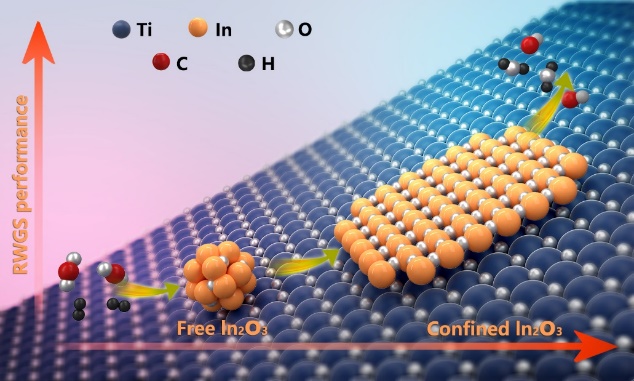
Confined catalysis has been regarded as an important strategy to modulate chemical reactions and enhance catalytic performance. Previous studies have demonstrated that the applications of confinement effect in catalysis are in enclosed nanospace. However, whether an open space has this effect is still unclear.
Recently, a research group led by Prof. BAO Xinhe and Prof. FU Qiang from the Dalian Institute of Chemical Physics (DICP) of the Chinese Academy of Sciences (CAS) revealed the interface confinement effect on open space in In2O3-TiO2 catalyst during reverse water gas shift (RWGS) reaction. This study was published in Journal of the American Chemical Society.
The researchers physically mixed In2O3 and TiO2 to obtain an In2O3-TiO2 catalyst for the RWGS reaction. They verified that the open surface of TiO2 could create a confined environment for In2O3, which drove the spontaneous transformation of free In2O3 nanoparticles into In oxide nanolayers (InOx) covering onto the TiO2 surface during RWGS.
Besides, the researchers found that the formed InOx nanolayers were easy to create surface oxygen vacancies but were against over reduction to metallic In in the H2-rich atmospheres, resulting in enhanced activity and stability compared with the pure In2O3 catalyst. They identified that the formation of interfacial In-O-Ti bonding drove the In2O3 dispersion and stabilized the metastable InOx layer.
Therefore, the researchers demonstrated that the InOx overlayers with distinct chemistry from their free counterparts could be confined on various oxide surfaces, and the important confinement effect at oxide/oxide interfaces.
"The interface confinement effect plays an important role in many oxide/oxide catalysts, which can be used to enhance the catalytic performance," said Prof. FU.

Confinement-induced indium oxide nanolayers formed on TiO2 for enhanced CO2 hydrogenation reaction. (Image by WANG Jianyang)

86-10-68597521 (day)
86-10-68597289 (night)

52 Sanlihe Rd., Xicheng District,
Beijing, China (100864)

